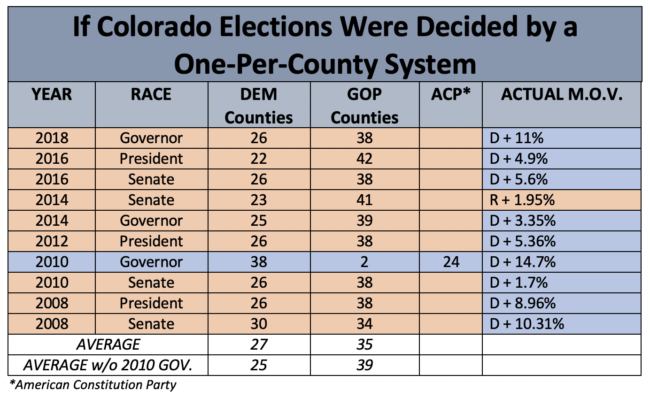
U.S. Senate
See Full Big Line
(D) J. Hickenlooper*
(R) Somebody
80%
20%

Governor
See Full Big Line
(D) Joe Neguse
(D) Phil Weiser
(D) Jena Griswold
60%
60%
40%↓

Att. General
See Full Big Line
(D) M. Dougherty
(D) Alexis King
(D) Brian Mason
40%
40%
30%

Sec. of State
See Full Big Line
(D) George Stern
(D) A. Gonzalez
(R) Sheri Davis
40%
40%
30%

State Treasurer
See Full Big Line
(D) Brianna Titone
(R) Kevin Grantham
(D) Jerry DiTullio
60%
30%
20%

CO-01 (Denver)
See Full Big Line
(D) Diana DeGette*
(R) Somebody
90%
2%

CO-02 (Boulder-ish)
See Full Big Line
(D) Joe Neguse*
(R) Somebody
90%
2%

CO-03 (West & Southern CO)
See Full Big Line
(R) Jeff Hurd*
(D) Somebody
80%
40%

CO-04 (Northeast-ish Colorado)
See Full Big Line
(R) Lauren Boebert*
(D) Somebody
90%
10%

CO-05 (Colorado Springs)
See Full Big Line
(R) Jeff Crank*
(D) Somebody
80%
20%

CO-06 (Aurora)
See Full Big Line
(D) Jason Crow*
(R) Somebody
90%
10%

CO-07 (Jefferson County)
See Full Big Line
(D) B. Pettersen*
(R) Somebody
90%
10%

CO-08 (Northern Colo.)
See Full Big Line
(R) Gabe Evans*
(D) Yadira Caraveo
(D) Joe Salazar
50%
40%
40%

State Senate Majority
See Full Big Line
DEMOCRATS
REPUBLICANS
80%
20%

State House Majority
See Full Big Line
DEMOCRATS
REPUBLICANS
95%
5%
 September 18, 2019 02:51 PM UTC
September 18, 2019 02:51 PM UTC 8 Comments
8 Comments

Wake me when the Equal Rights Amendment is ratified.
Very substantial diary, Pols. The one-per-County scenario is chilling; no wonder Broccoli’s in favor of a scenario so advantageous to Republicans.
There isn’t any widespread educational outreach campaign to persuade Coloradans to keep our membership in the National Popular Vote Compact. We really need big time voter outreach and education before the 2020 election.
Here's how you volunteer to join the effort:
https://www.coloradonpv.org/volunteer
Brauchler needs to study up on Supreme Court decisions.
Reynolds vs. Sims (1964)
The US Supreme Court ruled that the electoral districts of state legislative chambers must be roughly equal in population.
There's a whole lotta Supreme Court cases Brauchler needs to study up on. In the voting rights area, we should add Lucas v. 44th General Assembly of Colorado, which specifically addressed Colorado apportionment. But George should probably start with DC v. Heller so he can see the absurdity of his 2nd Amendment positions (of course, with the current SCOTUS, today's absurdity becomes tomorrow's precedent, I fear).
Colorado
64 counties, 6 million people
California
58 counties, 60 million people
Arizona
15 counties, 7 million people
Why does Colorado favor so much more government than other states?
HA!
Cause the rural, underpopulated areas of the state must be overrepresented.
Colorado taxpayers could save millions if we eliminated all counties with less than 3000 people.
School districts too – but seriously, don't get me started.
Football causes chronic traumatic encephalopathy (CTE) which causes brain damage.
On a national scale one-half of the US population lives in 143 of our 3,242 county and county-equivalents:
Some Republicans used to like the idea of a national popular vote, until 2016. Hard to say what exactly changed their minds…..